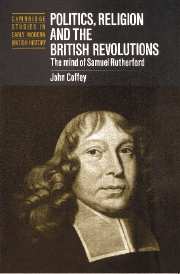Book contents
- Frontmatter
- Contents
- Acknowledgements
- List of abbreviations
- 1 Introduction
- 2 Biography
- 3 The scholar
- 4 The Puritan pastor
- 5 The Reformed theologian
- 6 The political theorist
- 7 The ecclesiastical statesman
- 8 The national prophet
- Conclusion: The failure of godly rule
- Bibliography of Samuel Rutherford
- General bibliography
- Index
- Titles in the series
Conclusion: The failure of godly rule
Published online by Cambridge University Press: 31 October 2009
- Frontmatter
- Contents
- Acknowledgements
- List of abbreviations
- 1 Introduction
- 2 Biography
- 3 The scholar
- 4 The Puritan pastor
- 5 The Reformed theologian
- 6 The political theorist
- 7 The ecclesiastical statesman
- 8 The national prophet
- Conclusion: The failure of godly rule
- Bibliography of Samuel Rutherford
- General bibliography
- Index
- Titles in the series
Summary
For all his single-minded devotion to the rule of Christ, Samuel Rutherford was a highly complex individual. We have seen that he was a scholastic humanist, and a cerebral enthusiast, a professor and ecclesiastical statesman who toiled in committees and assemblies with other men, and a pastor who cultivated intimate friendships with godly women. We have also learnt that though he is famed as an uncompromising defender of Scottish Presbyterianism, he fostered practices that are more often associated with English Independency and ended his days estranged from the majority within the kirk.
This complexity is also reflected in Rutherford's political thought, which is marked by its use of several different topoi. In Lex, Rex, Rutherford tried to balance the language of natural law with a biblical insistence on the need to preserve national religious covenants. He also employed the ancient constitutionalism and the apocalypticism that Arthur Williamson has seen as merging to produce ‘Scotland's heroic moment’ in 1638. If Rutherford's political theory is to be properly understood, each of these four modes of discourse must be taken into account. They came together from 1638 to 1648 to create a multi-faceted and powerful vision, one which gave the Scottish Covenanters a clear sense of their place in history and succeeded in balancing aristocratic and clerical interests.
However, there were always tensions between the two modes of political argument deriving from secular classical sources that stressed the role of the aristocracy (natural-law theory and ancient constitutionalism), and the two deriving from the Hebrew Scriptures which emphasised the importance of the people of God (religious covenantalism and apocalypticism).
- Type
- Chapter
- Information
- Politics, Religion and the British RevolutionsThe Mind of Samuel Rutherford, pp. 254 - 258Publisher: Cambridge University PressPrint publication year: 1997



